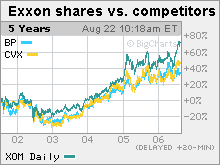|
Exxon: Oil, gas and that's it The company says its not interested in renewables. But when your business relies on a finite resource, is this really the best strategy? NEW YORK (CNNMoney.com) -- It's the most profitable corporation in the world. It's in a business that juggles geopolitics, economics and ecological health. It provides a finite resource which forms the backbone of our modern economy. Nearly every American is a customer and anxious about our nation's oil dependence.
Yet for all this, Exxon Mobil (Charts), the company that pocketed over $36 billion in 2005 alone, has said publicly that's it's not interested in investing in renewable energy. "There are very few that are economical without subsidies," Henry Hubble, vice president for investor relations, said during a recent conference call. "We don't think it makes sense to invest in it at this point." For Exxon and its shareholders, who make their money from a resource that is running out, how much sense does this make? According to some analysts, a lot. "A lot of companies over time have thrown money into wind and solar, and it hasn't turned out to be a good investment," said Jacques Rousseau, an oil analyst at the investment bank Friedman, Billings, Ramsey & Co. "Historically, they are a little warry of this." It's not just history that some say is giving Exxon cold feet. It's also the fact the oil and gas are Exxon's core business - and they know it much better than they know renewables. "They can't compete as effectively in those business as they can in their existing business," said Mark Gilman, an oil and gas analyst with the benchmark company. "I mean, you wouldn't want them to get into consumer goods." The growing divide Not everyone in the oil and gas business equates investing in wind and solar power as on the same level as selling, say, toothpaste. Several major oil companies tout their investments in renewable energy. Perhaps most noticeable is BP (Charts), the British energy giant that started spinning its initials in an ad campaign to stand for "beyond petroleum." Hard numbers of what oil majors spend on renewables are hard to come by, as none of them break it down in their annual reports. But BP's Sarah Howell said the company plans on pumping $10 billion into its renewable businesses over the next 8 years. "We think it's a market sector that is rapidly growing," said Howell. "We realize (oil) won't be forever, and you need to start looking into what your customers are going to want down the road." Much of BP's renewable spending will go into the company's 30-year old solar unit, which has just started turning a profit in the last two years. When asked why she thought BP could compete with other specialized renewable energy companies, Howell pointed to the length of time BP has been in the business. "We have a very strong history, strong R&D, a very good product choice," she said. Gaining experience in renewables is what a Chevron (Charts) spokesman cited as a main reason why that company is spending roughly $400 million a year in the renewables sector. Chevron's interests include hydrogen centers in the U.S., a geothermal operation in the Philippines and a joint venture making advanced batteries with a company called Cobasys. "When these technologies become commercially available, we'll be in the game," said the spokesman, Leif Sollid. Renewable energy: A spectator sport? So does this mean Exxon will be stuck on the sidelines? Hardly, say the analysts. "I think the company is close enough to what's going on, if there was an actual breakthrough they would be right there," said Rousseau. And Gilman noted that Exxon makes its business decisions going out to 2030, a time frame he considers to be far enough out and also a time when most believe carbon-based energy will still dominate the market. There is also some debate as to how sidelined Exxon is. Barbara Shook, an analyst with Energy Intelligence Group, said Exxon is just as involved with renewables as the other oil majors, they just don't spend the money on public relations hyping it. "They just don't care if everybody feels they are warm and fuzzy," said Shook. "They are in business to make money, not teddy bears." Still, not everyone views the company's apparent non-interest in renewable as a good thing. "I know in the coming years, as a commodities analyst, I'm going to be looking at (renewables) more and more," said Peter Beutel, an energy analyst at Cameron Hanover. "I'd be surprised that a major oil company isn't looking at them as well." Beutel also brought up a point that doesn't speak directly to the business strategy, but rather Exxon's larger role in shaping the country's energy policy. He said that by not investing in renewables, the company is putting itself at odds with the sector in general, and could lobby against government subsidies and other support programs for the fledging renewable industry. "As a major energy company, I wouldn't want to be coming out and saying that," said Beutel. "It begs a lot of other questions." |
|



